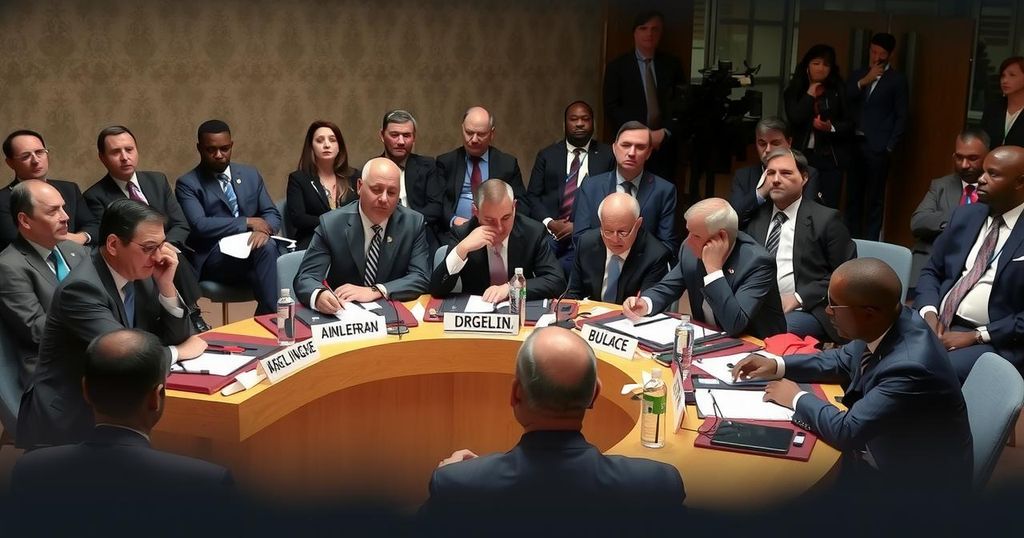The UN Security Council met to discuss the critical situation in eastern DRC, where violence persists due to armed groups like ADF and M23. UN Special Representative Bintou Keita highlighted regional mediation efforts and governance reforms aimed at restoring stability. Despite some progress, the humanitarian crisis, gender-based violence, and illegal resource exploitation continue to pose significant challenges.
The United Nations Security Council convened on Monday to address the urgent need to alleviate ongoing violence in the eastern Democratic Republic of the Congo (DRC). The UN Special Representative, Bintou Keita, reported on the increasing instability in the North Kivu and Ituri provinces, fueled by the activities of armed groups including the ADF, M23, CODECO, and Zaïre. Keita highlighted both local and regional efforts, particularly the mediation led by Angola, emphasizing the importance of continued international support to establish lasting peace.
In light of a summit scheduled for December 15, where leaders from Angola, the DRC, and Rwanda will gather, Keita expressed hope that this meeting would showcase the progress achieved thus far. She underscored the necessity for a cohesive approach that encompasses recommendations from various stakeholders—including armed groups, civil society, and women—to foster true stability.
Keita outlined ongoing governance reforms initiated by DRC authorities aimed at enhancing the populace’s welfare, emphasizing the critical need for collaboration among stakeholders to diffuse tensions regarding potential constitutional revisions.
Moreover, she commended the progress toward a ceasefire agreement between the DRC and Rwanda and the establishment of a verification mechanism to ensure compliance, despite the ongoing threats posed by the M23, which has expanded its territorial control.
Keita shed light on the precarious security situation amid ongoing challenges associated with resource exploitation, calling for regional coordination to combat illegal activities that empower armed factions. Additionally, she noted the dire humanitarian circumstances exacerbated by conflict and climate issues, with millions displaced and multiple epidemics afflicting the population.
As the 16 Days of Activism against Gender-Based Violence campaign concludes, Keita highlighted the alarming statistics regarding gender-based violence, while recognizing the DRC Government’s initiatives to address and combat this issue, including reparations for victims. Keita reiterated her commitment to uphold a zero-tolerance policy on allegations of exploitation by UN personnel.
Finally, Keita echoed the calls from displaced women and individuals with disabilities for peace and stability in the region, urging significant investment in their well-being. These voices collectively demand a return to their homes and education with dignity, illustrating the human cost of the ongoing conflict in eastern DRC.
The Democratic Republic of the Congo has faced prolonged instability and violence, particularly in its eastern provinces, exacerbated by the activities of various armed groups. The situation is complicated by political disputes, resource exploitation, and humanitarian crises, which have displaced millions. Efforts by local and international actors, notably through initiatives like the Luanda process and the Nairobi process, aim to create pathways for peace and stability, though significant challenges remain. The issue of gender-based violence is also a critical concern, underscoring the need for inclusive responses to the conflict’s impacts.
The recent Security Council meeting underscored the urgency of addressing the ongoing violence in eastern DRC, with a focus on the complex interplay of armed conflict, political stability, and resource management. Keita’s report emphasized the necessity of collaborative efforts involving regional stakeholders and the global community to forge lasting peace. The alarming rates of gender-based violence and humanitarian crises further demonstrate the dire need for sustained attention and action. The upcoming summit and existing initiatives hold potential, yet the road to stability in eastern DRC remains fraught with challenges that require comprehensive and coordinated responses.
Original Source: news.un.org






